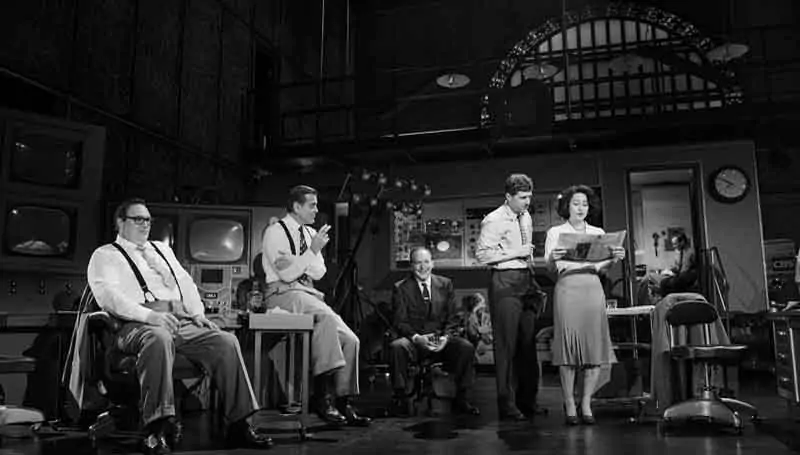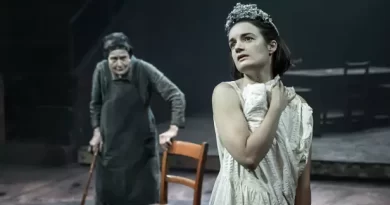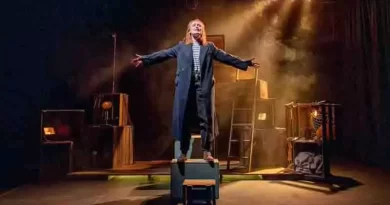“Good Night, and Good Luck” at Winter Garden Theatre, New York
Glenda Frank on Broadway
29 April 2025
Good Night, and Good Luck demands attention for reasons that go beyond George Clooney’s first and welcome Broadway appearance and the timely subject matter. The play, by Clooney, who stars, and Grant Heslov, adapted from their 2005 film of the same title, is about integrity and courage. It’s about people willing to put their careers and their lives on the line. Few topics are more compelling, and David Cromer’s dynamic directing on the large Winter Garden Theatre stage is a major aspect. The title was Edward R. Murrow’s signature sign-off.

George Clooney as Edward R. Murrow.
Photo credit: Emilio Madrid.
The play is set in 1954. Four years earlier, when McCarthy, the junior senator from Wisconsin, used techniques similar to those of the House Unamerican Activities Committee (his own activity was Senate investigations) to flush out communists and sympathizers, he discovered tools that would catapult him to national headlines.
For years, McCarthy strong-armed his high-profile suspects into naming names so that those accused of subversive actions could evade the career-ending blacklist. Only a handful of Americans stood up to him to little avail. The topic has been covered on stage recently in London with the play Here in America by David Edgar. Playwright Lillian Hellman proclaimed that to hurt innocent people in order to save herself was indecent. “I cannot and will not cut my conscience to fit this year’s fashions.” The lawyer Joseph Welch asked McCarthy “Have you no sense of decency, sir, at long last?” By 1954, the senator was starring in his own television show, “McCarthy Hearings,” 36 days of investigative hearings.
In 1951, Edward R. Murrow, famous for his reportage during World War II, created See It Now, a CBS newsmagazine and documentary series with producer Fred W. Friendly. They took on McCarthy the first time in 1953 in a segment dedicated to Lieutenant Milo John Radulovich, who was accused of posing a security risk although the record stated that there was no question of the lieutenant’s loyalty. His crime was his continued association with his father and sister, who read “subversive” newspapers. The show resulted in Radulovich’s reinstatement.
Good Night and Good Luck takes us into a bustling newsroom, Studio 41, where we meet the team that helped change America. During set changes (impressive design by Scott Pask, Tony Award for the Book of Mormon), Ella (Georgia Heers), with the band in their own rehearsal stage, sings some pop standards, like “Let’s Face the Music and Dance” and “I’ve Got My Eyes on You” which are both delightful period markers and commentary on the time.
Photo credit: Emilio Madrid.
Courage comes in big and small packages. There are the personal stories. The appealing writers Joe (Carter Hudson) and Shirley Wershba (the extraordinary Ilana Glazer) are secretly married despite company policy. When there is a downsizing, it’s recommended that she voluntarily resign. Directly targeted by a McCarthy-aligned columnist, Don Hollenbeck (Clark Gregg, A Few Good Men) feels the senator’s shadow and offers his resignation. The team debates accepting it, but Murrow flatly refuses to let him go. (Later, the frenetic newsroom stops at the news of Hollenbeck’s suicide. Cromer’s (The Band’s Visit) pacing creates a poignant high point.)
As for the large package, Murrow and Friendly (Glenn Fleshler, Death of a Salesman ) nervously join forces as they confront William S. Paley (Paul Gross), the president of CBS who is worried about retribution and the loss of advertising revenue, especially from Alcoa Aluminum. Having received a green light, Murrow is careful. On the first broadcast, he only uses McCarthy’s words against him. We see the senator in vintage footage. On the second broadcast, McCarthy is given time for a rebuttal. And on the third, Murrow has his say. He is reasoned, logical, so balanced he seems to bend over backwards to be fair, and totally trustworthy. He both wins and loses. McCarthy’s power is squelched, but the newsroom budget is cut. In the end, victory is still his as we see a parade of television images through the decades – the news coverage that keeps us informed.
During these exchanges, the audience sees a sliver of Clooney backstage as he broadcasts, but he’s full face on the several black and white television monitors on the stage. Clooney allowed the celebrity to be the role, a modesty I did not expect and fully admired. There were many stand-out performances but in general the cast worked as an ensemble. There is a sense of realia to the production, which makes it unforgettable. Good Night and Good Luck affected me deeply, and the stagecraft deserves awards.










